A look at the month’s best reviewed crime novels, mysteries, and thrillers.


Jeff VanderMeer, Hummingbird Salamander (MCD)
“[VanderMeer] uses spy fiction to show how spy fiction can’t help us when the sky falls in. Or heats up … Like your favorite Hollywood blockbuster, Hummingbird Salamander features ecoterrorists, evil corporations, a race to defuse doomsday weapons, gunfire, fisticuffs, action sequences and hair-raising escapes … like Ling Ma and Holroyde, VanderMeer introduces all this genre fun mostly to subvert it … part of what the novel is doing is showing how humans are connected to the rest of nature even when we’d rather not think about it. The planet on which Jane gets her coffee from some barista is the same in which the last hummingbird dies in a dwindling forest … The secret interconnections of the spy novel map onto the secret interconnections of the natural world. And the unfurling plot mirrors the unraveling ecosystem … the book’s redemption isn’t imaginable in the terms of a pulp spy novel. VanderMeer and some of his peers struggle with genre because they understand that the ecological crisis is also a narrative crisis. When all you have are the old stories, how can you speak a new ending?”
–Noah Berlatsky (Los Angeles Times)

Will Thomas, Dance with Death (Minotaur)
“Buoying them throughout this whirlwind quest is devotion to duty, their quick-witted banter and the thrill of the chase. When a stroke of good fortune forces Llewelyn to decide whether or not to continue working with Barker, there can be little doubt what his choice will be.”
–Tom Nolan (Wall Street Journal)
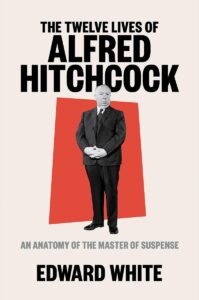
Edward White, The Twelve Lives of Alfred Hitchcock (W.W. Norton)
“It’s said that more books have been written about Hitchcock than any other filmmaker. Edward White’s sleek and modest The Twelve Lives of Alfred Hitchcock does not offer grand revelation but a provocative new way of thinking about biography … Strangely, through these refractions, we receive a smoother, more cohesive sense of a man so adept at toying with his audience, on and off the screen … White’s style is unadorned and unobtrusive; only occasionally does he allow himself a little turn of phrase…The psychologizing is of a delicate sort — far from Hitchcock’s own ham-handed attempts, which his own characters seemed to mock … White never forces an explanation or coherence. The radial structure vibrates, like Hitchcock’s best films, with intuition and mystery.”
–Parul Sehgal (New York Times Book Review)

Mark Aldridge, Agatha Christie’s Poirot: The Greatest Detective in the World (Harpercollins)
“Why did I ever invent this detestable, bombastic, tiresome little creature?’ sighed Christie in a 1937 article … Agatha Christie’s Poirot, a one-stop guide to all things Poirot, an exhaustive catalog of all manifestations of the little Belgian in any conceivable medium, from novel to story to radio play to movie to graphic novel to computer game, provides us with a beautifully succinct answer.”
–Christoph Irmscher (Wall Street Journal)
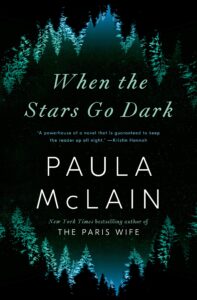
Paula McLain, When the Stars Go Dark (Ballantine)
“This is a haunting, intelligent novel for the discerning reader; the thinking man’s page-turner; a riveting crime-detective story … wonderfully paced … McClain is at her finest when depicting the woods … an enthralling foray into the step-by-step mechanics behind the hunt for a child abductor that grows with surprising linkages into the search for a serial killer hiding in plain sight … painstaking detail and knowledge of the criminal mind’s minutiae … an intriguing, harrowing story that suggests we should never grow comfortable in a false sense of security even as it praises the merits of small-town community life. It’s a masterfully written story of resolution and reconciliation that operates on multiple levels of time, mind, and spirit. As for the poetic title, McClain hits a high note.”
–Claire Fullerton (New York Journal of Books)

Richard O’Rawe, Northern Heist (Melville House)
“O’Rawe writes stylishly without glamorising these men … It feels we are being allowed to peer in on an old job. O’Rawe’s confidence as a storyteller takes off as the heist begins, dropping you in all kinds of damned places, with piercing echoes of Maurice Leitch’s merciless but pitch-perfect 1981 tale Silver’s City … the novel we have been waiting for from one formerly involved in the Troubles. Here is a writer who has lifted himself out of the trench of communal politics recalibrated as literature, where every book, play or poem is a continuation of the struggle, the ‘Brits’ always the villains, a united Ireland always the end goal. It marks a step forward for Troubles protagonist literature (and, perhaps, Irish republicanism itself) by moving beyond it, confirming the arrival of a creative voice of note and potential.”
–Connal Parr (Irish Times)
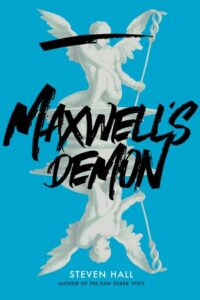
Steven Hall, Maxwell’s Demon (Grove)
“I read Maxwell’s Demon in proof in 2019, publication was delayed because of the pandemic, and it is now here. I re-read it in the finished copy and it was more than worth the wait, and rewarded being read twice. I found even more traps, foreboding fore-shadowings, dialogue that only reveals its true importance in retrospect, sly references and clever sleights of hand. It is also – ingeniously – about a long-awaited difficult second novel … It moves at an exhilarating lick, as befits its pop culture propensities, but with highbrow sensibilities, its concerns including the Kabbalah, whether the world is made of words, the origins of the alphabet, the mythopoetic nature of the hero’s journey and what angels look like … But the genius of the book is that despite it seeming like an elegant orrery, all these wheels within wheels are a carapace, a psychic armour against a grief (and it’s not the grief you were expecting). Beneath this truly beautiful astrolabe is a beating human heart.”
–Stuart Kelly (The Scotsman)

Zhanna Slor, At the End of the World, Turn Left (Agora Books)
“Anna’s fate will definitely surprise readers. It’s rare to find a debut mystery crafted with such elegance and authenticity, let alone in a place that has been so neglected as a literary location. Slor’s next novel will be one to anticipate.”
–Bethanne Patrick (NPR)
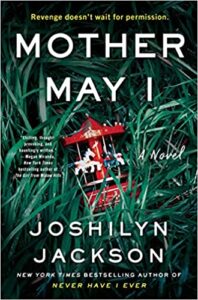
Joshilyn Jackson, Mother May I (William Morrow)
“Ms. Jackson crafts a finely paced, shrewdly observed, multi-tiered story which moves with ease between past and present. Older events that prompt current actions are uncovered; pressing issues of class, race and sexual abuse are viscerally dramatized … a thinking (and feeling) reader’s thriller, a literary beach read.”
–Tom Nolan (Wall Street Journal)
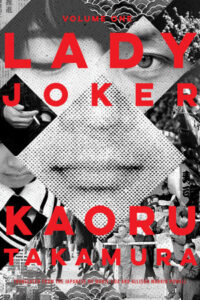
Kaoru Takamura (transl. Allison Markin Powell and Marie Iida), Lady Joker (Soho)
“… a layered examination of Japan’s current social and economic inequities … Takamura’s challenging, genre-confounding epic offers a sweeping view of contemporary Japan in all its complexity.”
–(Kirkus)

















